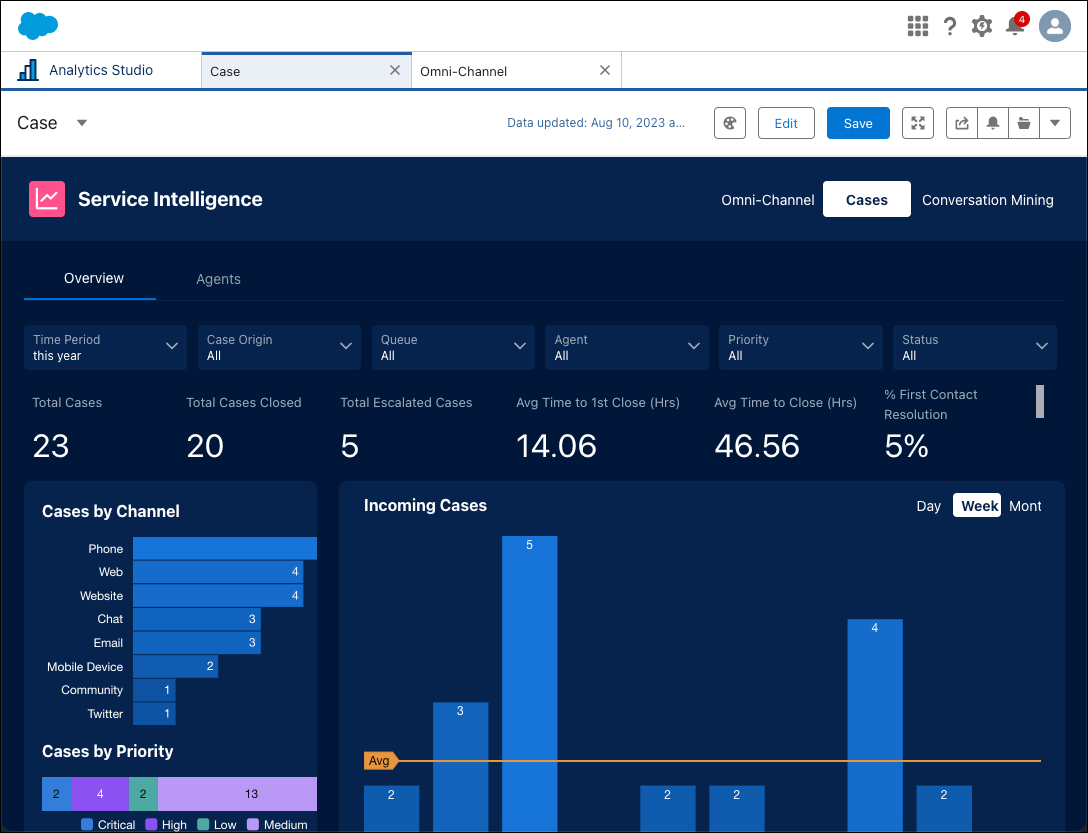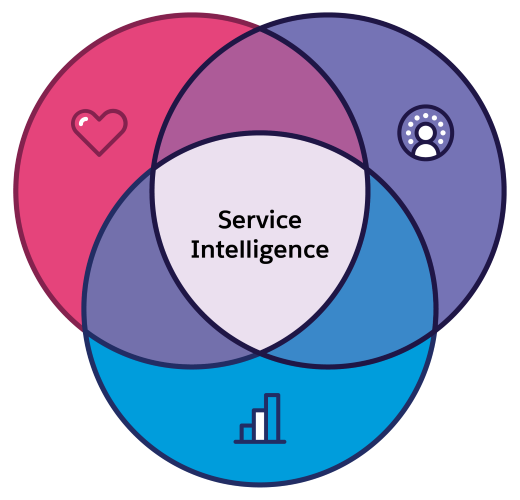Get Started with Service Intelligence
After completing this unit, you’ll be able to:
- Describe Service Intelligence.
- Explain how Service Intelligence works.
What Is Service Intelligence?
Customer service can be challenging to measure. You want to provide great service to your customers, but it’s hard to know whether you’re meeting that goal. Also, it’s not always clear how your service team is performing. Your team helps customers and resolves cases, but do customers feel happy and does your team meet service level agreements (SLAs) on time? Additionally, service agents may want to know how they’re doing. Did they achieve their goals or fall short of daily, weekly, or monthly expectations?
Service Intelligence answers these questions. With easy-to-understand data visualizations, it takes the guesswork out of whether you’re meeting your customer service goals. Service Intelligence collects your customer data in one place to provide valuable insights into your service operations.
The insights from your data help you understand service trends, agent behaviors, and customer satisfaction across your service channels, such as email, chat, and voice. Service Intelligence offers key performance indicators (KPIs) and artificial intelligence (AI) capabilities to help you make better service decisions from your data.

Who Is Service Intelligence For?
Service Intelligence is designed for executives, service managers, and service agents.
Executives
Executives measure performance, predict risks, and review costs to ensure success. Service Intelligence provides executives with a real-time snapshot of their service operations to support decisions on reducing costs and inefficiencies.
Service managers
Service managers need to understand agent performance, customer satisfaction scores (CSAT), and service costs. Service Intelligence shows insights at a glance. It helps managers discover opportunities for improving customer service, tracks team workloads across channels, and identifies areas for self-service or automation.
Service agents
Agents want to know whether they’re meeting service requirements. Service Intelligence helps agents identify any escalations, prioritize cases, and evaluate the duration of case resolution.
Anyone assigned the right permissions in your Salesforce org can view the data leveraged by Service Intelligence; it’s not limited to specific roles. To turn on Service Intelligence, Salesforce administrators need permission to set up Data 360, Service Cloud, and CRM Analytics. Like other Salesforce features, you can customize Service Intelligence to focus on what you need. Let’s look at how Service Intelligence works.
How Service Intelligence Works
Service Intelligence combines Service Cloud, Data 360, and CRM Analytics to visualize customer service KPIs.

- Starting with Service Cloud, turn on critical features such as Surveys, Omni-Channel, and Email-to-Case (if you haven’t turned them on already). This ensures that service data is available for Data 360.
- Connect Data 360 to your Salesforce org. This helps you store your customer data at a massive scale and install data kits. After you install the Service data kit, you can create data stream bundles and include Data Model customization and relationships for your customer service KPIs. Einstein Conversation Mining is included in the Service data kit. It uses machine learning (a type of AI) and existing conversation data to identify the top reasons your customers contact you.
- Enable CRM Analytics in your Salesforce org, and integrate it with Data 360. This adds your data to pre-built dashboards so you can easily see and analyze your customer service KPIs.
- Assign Service Intelligence permission sets to those who need to see and manage the data.
Once Service Intelligence is set up, you’re ready to use its key features.
Service Intelligence Features
Here are some key Service Intelligence features that can help you make service decisions.
Pre-built dashboards
Access readymade dashboards without building custom reports or dashboards. See your service data categorized by cases, agent, omni-channel, conversation mining, and time period. Schedule when to refresh your dashboard data.
Instant service KPIs
Spot a variety of KPIs, such as:
- Average speed to answer
- Average time to close
- Percentage of service level met
- Percentage of first contact resolution
- Average active time by agent
- Average cost per interaction
- Average agent CSAT (customer satisfaction score)
Conversation mining
Review key reasons why your customers reach out for help, as determined by Einstein AI. Prioritize contact reasons that are meaningful and actionable first, and give your service team the best return on their time by identifying opportunities for automation.
With Service Intelligence, your service decisions and operations just got smarter.
Resources
- Trailhead: Customer Service with Salesforce: Quick Look
- Trailhead: Salesforce Data 360: Quick Look
- Trailhead: CRM Analytics: Quick Look